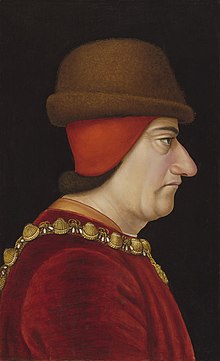This article needs additional citations for verification. (November 2024) |
| Louis XI | |
|---|---|
 | |
| King of France | |
| Reign | 22 July 1461 − 30 August 1483 |
| Coronation | 15 August 1461, Reims |
| Predecessor | Charles VII |
| Successor | Charles VIII |
| Born | 3 July 1423 Bourges, Berry, France |
| Died | 30 August 1483 (aged 60) Château de Plessis-lez-Tours, France |
| Burial | 6 September 1483 Notre-Dame de Cléry Basilica, Cléry-Saint-André |
| Spouses | |
| Issue Detail | |
| House | Valois |
| Father | Charles VII of France |
| Mother | Marie of Anjou |
| Signature |  |
Louis XI (3 July 1423 – 30 August 1483), called "Louis the Prudent" (French: le Prudent), was King of France from 1461 to 1483. He succeeded his father, Charles VII. Louis entered into open rebellion against his father in a short-lived revolt known as the Praguerie in 1440. The king forgave his rebellious vassals, including Louis, to whom he entrusted the management of the Dauphiné, then a province in southeastern France. Louis's ceaseless intrigues, however, led his father to banish him from court. From the Dauphiné, Louis led his own political establishment and married Charlotte of Savoy, daughter of Louis, Duke of Savoy, against the will of his father. Charles VII sent an army to compel his son to his will, but Louis fled to Burgundy, where he was hosted by Philip the Good, the Duke of Burgundy, Charles' greatest enemy.
When Charles VII died in 1461, Louis left the Burgundian court to take possession of his kingdom. His taste for intrigue and his intense diplomatic activity earned him the nicknames "the Cunning" (Middle French: le rusé) and "the Universal Spider" (Middle French: l'universelle aragne), as his enemies accused him of spinning webs of plots and conspiracies.
In 1472, the subsequent Duke of Burgundy, Charles the Bold, took up arms against his rival Louis. However, Louis was able to isolate Charles from his English allies by signing the Treaty of Picquigny (1475) with Edward IV of England. The treaty formally ended the Hundred Years' War. With the death of Charles the Bold at the Battle of Nancy in 1477, the dynasty of the dukes of Burgundy died out. Louis took advantage of the situation to seize numerous Burgundian territories, including Burgundy itself and Picardy.
Without direct foreign threats, Louis was able to eliminate his rebellious vassals, expand royal power, and strengthen the economic development of his country. He died in 1483, and was succeeded by his minor son Charles VIII.